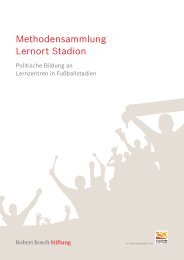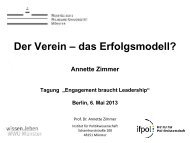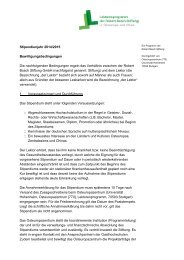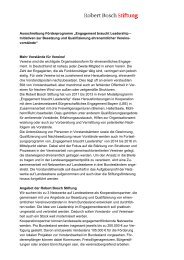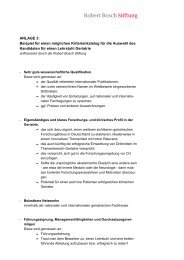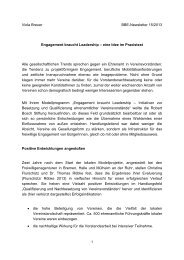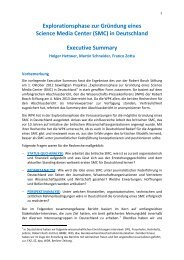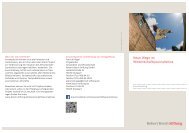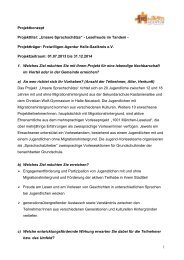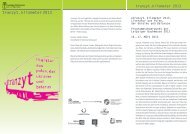Turkey, Its Neighbors and the West - Robert Bosch Stiftung
Turkey, Its Neighbors and the West - Robert Bosch Stiftung
Turkey, Its Neighbors and the West - Robert Bosch Stiftung
You also want an ePaper? Increase the reach of your titles
YUMPU automatically turns print PDFs into web optimized ePapers that Google loves.
Driven by different priorities, <strong>Turkey</strong>’s energy policy can<br />
be viewed as contradictory. 20 <strong>Turkey</strong>’s own dependence on<br />
russian energy has detracted from its potential for reducing<br />
europe’s dependence on russian gas. ankara <strong>and</strong> Moscow<br />
have reached several agreements, described by russian<br />
leaders as a “strategic partnership.” 21 <strong>Turkey</strong> has signed up<br />
to russia’s south stream project (see Map 3). <strong>Turkey</strong> <strong>and</strong><br />
russia have also agreed to supplement <strong>the</strong> blue stream<br />
pipeline under <strong>the</strong> black sea with blue stream II to supply<br />
additional gas to <strong>the</strong> Turkish domestic market <strong>and</strong> beyond. as<br />
a result, nabucco, if built, may also be fed by russian gas, a<br />
possibility that would undercut its original purpose, but one<br />
with which all major players appear satisfied. Dependency on<br />
russia weakens <strong>Turkey</strong>’s claim that it is a central power with<br />
an equally neutral st<strong>and</strong>ing to all parties in its neighborhood.<br />
<strong>Turkey</strong>, Trade, <strong>and</strong> Regional<br />
Economic Integration<br />
<strong>Turkey</strong>’s regional engagement has opened new economic<br />
horizons. If <strong>Turkey</strong>’s neighborhood prospers economically,<br />
it should become more stable, <strong>and</strong> <strong>Turkey</strong> would benefit.<br />
<strong>Turkey</strong>’s own economic performance can have positive effects<br />
on <strong>the</strong> st<strong>and</strong>ard of living in <strong>the</strong> immediate neighborhood,<br />
through intensified cross-border trade, transfers of money,<br />
capital, <strong>and</strong> knowledge, <strong>and</strong> increased immigration. These<br />
phenomena, however, also highlight some of <strong>the</strong> limitations<br />
of <strong>Turkey</strong>’s ambitious policies.<br />
between 1991 <strong>and</strong> 2008, <strong>Turkey</strong>’s trade relations within its<br />
neighborhood increased considerably. In 1991, <strong>the</strong> level of<br />
trade was relatively small, barely a quarter of <strong>Turkey</strong>’s trade<br />
with <strong>the</strong> eu at <strong>the</strong> time. but while <strong>Turkey</strong>’s level of trade with<br />
<strong>the</strong> eu grew eightfold between 1991 <strong>and</strong> 2008, it increased<br />
more than twentyfold in its immediate neighborhood (see<br />
Table 3), while <strong>the</strong> potential for fur<strong>the</strong>r growth remains. an<br />
indication of <strong>Turkey</strong>’s openness to its neighborhood is <strong>the</strong><br />
dramatic increase of Turkish airlines (ThY) flights to <strong>the</strong><br />
Middle east <strong>and</strong> north africa (Mena) <strong>and</strong> <strong>the</strong> ex-soviet<br />
World in recent years. In 1971, ThY flew to 17 destinations<br />
in 11 countries, overwhelmingly in <strong>West</strong>ern europe. There<br />
were no flights whatsoever to <strong>the</strong> former soviet world until<br />
1989, when <strong>the</strong> first flight to Moscow was added, along with<br />
a route to lebanon <strong>and</strong> Israel, respectively. by 2009, <strong>the</strong><br />
airline offered a total of 113 flights to 70 countries, including<br />
39 destinations to <strong>the</strong> former communist block <strong>and</strong> 23<br />
destinations to <strong>the</strong> Mena countries. 22<br />
<strong>Turkey</strong>’s trade with <strong>the</strong> region is highly skewed, with russia<br />
accounting for 11.3 percent of its total (see Table 3). russia,<br />
C H A P T E R<br />
toge<strong>the</strong>r with Germany, is now <strong>Turkey</strong>’s largest trading partner<br />
<strong>and</strong> supplies two thirds of <strong>Turkey</strong>’s imported gas <strong>and</strong> nearly<br />
one third of its imported oil. This has created a considerable<br />
level of Turkish energy dependence on russia, as well as a<br />
trade deficit with <strong>the</strong> country.<br />
on <strong>the</strong> whole, <strong>Turkey</strong>’s main trading partner remains <strong>the</strong><br />
eu, particularly Germany, <strong>the</strong> united Kingdom, france, <strong>and</strong><br />
Italy. 23 The eu 27 accounted for about 55 percent of Turkish<br />
exports <strong>and</strong> 45 percent of Turkish imports over <strong>the</strong> last ten<br />
years. This led to a trade deficit with <strong>the</strong> eu of about usD 11<br />
billion in 2008. Increasingly, however, o<strong>the</strong>r partners such<br />
as China, India, <strong>and</strong> <strong>the</strong> Gulf nations are becoming part of<br />
<strong>Turkey</strong>’s trade l<strong>and</strong>scape.<br />
<strong>Turkey</strong>’s Migration Policy<br />
besides trade <strong>and</strong> energy policies, <strong>Turkey</strong> has used migration<br />
policy to fur<strong>the</strong>r its foreign policy goals. on both emigration<br />
<strong>and</strong> immigration, <strong>Turkey</strong> has become more proactive. It has<br />
done away with its past neutral policies to take advantage<br />
of newly opened regions. <strong>Its</strong> new policies have led to higher<br />
levels of overall interaction between <strong>Turkey</strong> <strong>and</strong> <strong>the</strong> countries<br />
in its neighborhood.<br />
since <strong>the</strong> early 1990s, <strong>the</strong> Turkish government has sought<br />
to promote Turkish entrepreneurs <strong>and</strong> workers in <strong>the</strong> black<br />
sea, <strong>the</strong> Caucasus, <strong>and</strong> Central asia. While <strong>the</strong> Turkish<br />
government had been neutral regarding <strong>the</strong> emigration of<br />
Turkish labor to europe <strong>and</strong> <strong>the</strong> Gulf, by <strong>the</strong> 1990s, under<br />
prime Minister Özal’s leadership, it recognized <strong>the</strong> need to<br />
proactively encourage investment in <strong>the</strong> construction sector<br />
within its neighborhood. To do so, it established a liberal visa<br />
regime to facilitate <strong>the</strong> movement of people in <strong>and</strong> out of<br />
<strong>Turkey</strong>, as well as reciprocal market penetration.<br />
but visa policy has varied in <strong>the</strong> 2000s. between 2002 <strong>and</strong><br />
2005, <strong>Turkey</strong> tightened its visa policies in order to comply<br />
with <strong>the</strong> restrictive eu schengen system. beginning in<br />
2005, however, <strong>the</strong> Turkish government started reversing<br />
<strong>and</strong> exp<strong>and</strong>ing its liberal visa policy toward most neighbors.<br />
since 2009, <strong>Turkey</strong> appears to have pursued a systematic<br />
policy of visa liberalization by signing a series of bilateral<br />
visa-free agreements with countries in its neighborhood. Visafree<br />
agreements have been reached with lebanon, albania,<br />
Jordan, libya, Qatar, <strong>and</strong> even long-time foe syria. strikingly,<br />
in May 2010, an agreement on visa-free travel was also<br />
reached with russia (see Map 4). These agreements have led<br />
to increased Turkish travel within <strong>the</strong> neighborhood, as well<br />
as a sharp increase in <strong>the</strong> number of people entering <strong>Turkey</strong><br />
3<br />
19



